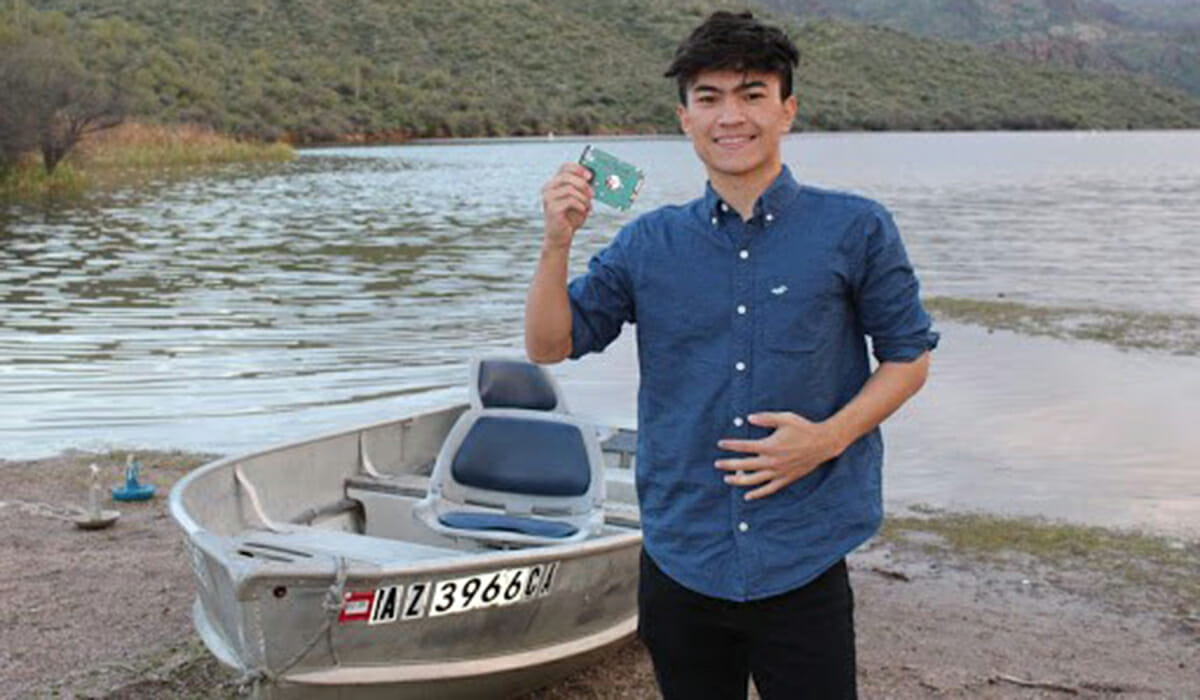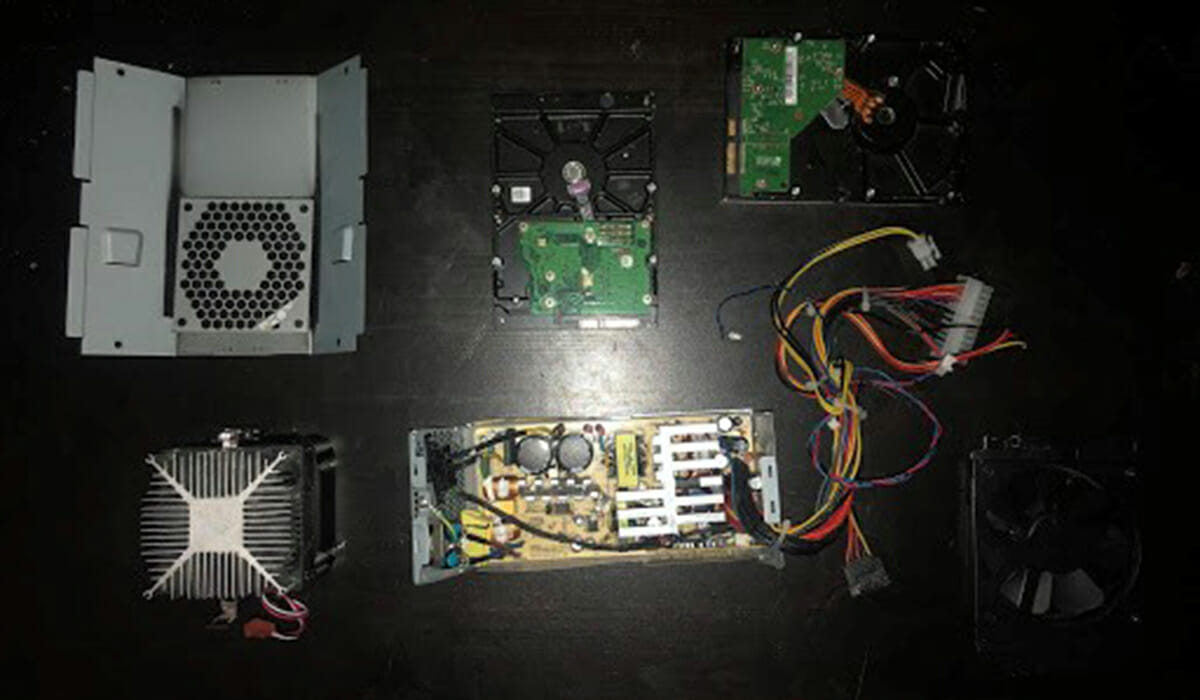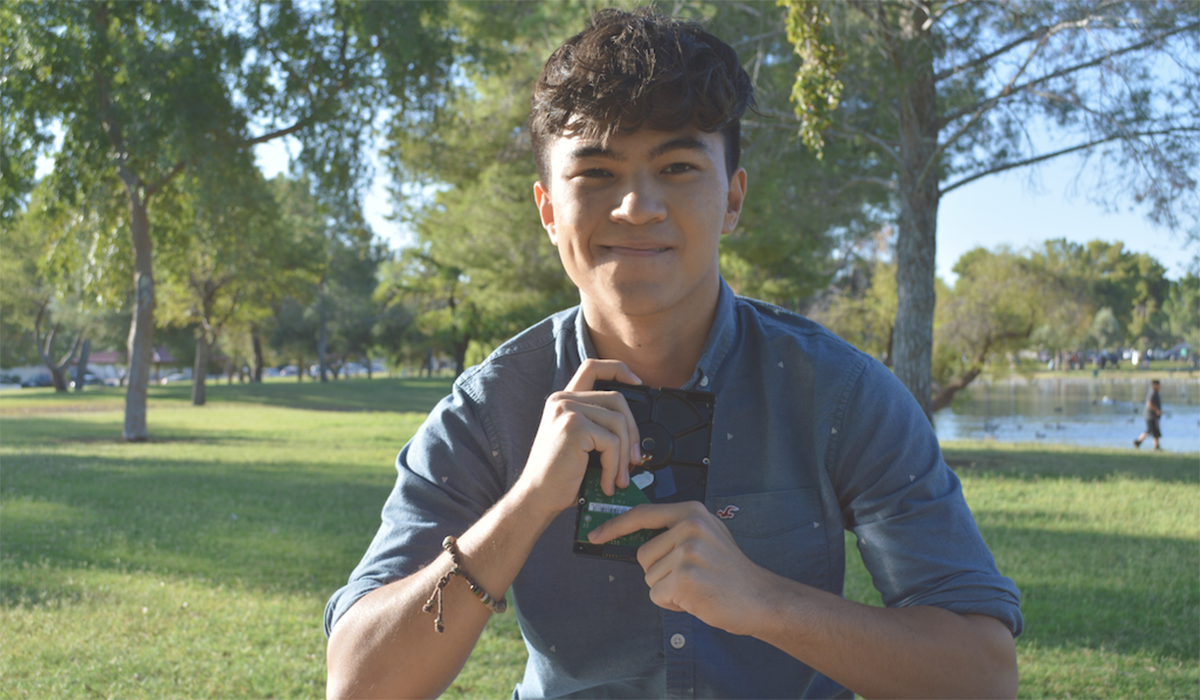Teen Develops Aquatic Tracking Chips To Help Promote Marine Sustainability

Meet Daily Point of Light Award honoree Ethan Wilk. Read his story and nominate an outstanding volunteer or family as a Point of Light.
Ethan Wilk was shocked and confused after witnessing the 2010 Deepwater Horizon oil spill that occurred in the Gulf of Mexico while the then-eight-year-old was living in Texas. Witnessing the disaster inspired Ethan to volunteer for local marine sustainability initiatives. After moving to Scottsdale, Ariz., he started questioning how he could help their marine ecosystems as well. Pairing that passion with his interest in technology and computer science, Ethan started working with nearby university professors to develop blockchain technology to make aquatic tracking chips for fish.
About ten years after witnessing the disaster that sparked his interest in marine sustainability, Ethan is now the founder and director of operations for the nonprofit The Xenia Project, which uses blockchain technology to conserve marine ecosystems through the tracking chips he developed. With the help of over 500 volunteers, The Xenia Project has tagged 1,100 fish and saved three species since its inception in 2017. Ethan was primarily working in the White Mountains of Arizona, but recently partnered with the World Wildlife Fund to help conserve species in Australia as well. While the pandemic has slowed that partnership, Ethan hopes to start tagging fish in Australia this summer.
Describe what The Xenia Project is.
The Xenia Project started back in 2017, but my interest in marine sustainability has been with me since I was pretty young. I originally lived over in Texas for awhile near the Galveston Bay, and when I was around eight years old, I ended up witnessing the Deepwater Horizon oil spill while I as down there. It took a toll on me as a young person, so I began volunteering at marine sustainability initiatives. I eventually came here to Arizona where we don’t have a beach or a whole lot of bodies of water, but having that experience from Texas where the marine community was a big deal, it really stuck with me and pushed me to question how I could spark my own efforts here to turn attention toward these marine ecosystems we have. Specifically as I got older, I began really researching blockchain technology, because technology and computer science always fascinated me. I began noticing some of the characteristics of blockchain seemed to be able to meet some of the needs of the marine sustainability movement. I ended up working with some professors at nearby universities to materialize these aquatic tracking chips that I envisioned which used blockchain to track fish. Obviously we’re a bit thwarted by the pandemic, but essentially we try to manufacture tracking chips which can be attached to endangered fish in a noninvasive way, and then we can track their migration patterns so we can determine where they’re going extinct and why they’re going extinct.
What is your role with The Xenia Project?
I’m currently the director of operations for the project. With that role, in a normal year I would organize volunteer outings and fundraisers to not only fund the project but also to actually get helping hands to come to the lakes and help us tag these fish. Specifically this year, due to everything that’s going on, I’ve taken something more of a CFO role. With the pandemic happening, I had to cancel all our volunteer outings and fundraisers because there’s no way we could do it, so we’re losing a lot of funds we needed. As a result of that, I began to look toward grants and endowments and other methods of funding the project to keep it viable through the pandemic. My role as the director of operations is really concerned with keeping the organization afloat but also expanding it and extending its reach into areas we’ve never been able to before.

Why is it important for these fish to be tagged to promote marine sustainability?
One of the main issues when it comes to marine sustainability is transparency, because with terrestrial animals, it’s a lot easier to track them visibly or with a normal tracker. When things are under the water, sometimes you’re dealing with oceanic animals that are miles below the water so it’s not very easy to keep a tab on them. The best you can do is use a chip, but in most standard procedures, that process is very difficult. First of all, tagging fish is a challenge. Secondly, not fully understanding what’s going on below the water could also pose some threats and could meddle with the data you collect. By using blockchain, we’re able to track these fish and say at point A, we had 100 fish, and point B, we only had 50 fish, so then we can determine the segment of their migrational pattern at which the majority of these fish seem to be disappearing, and we can situate funds and efforts to better investigate what’s going on to drive their extinction.
Where have you expanded outside of Arizona?
We haven’t been able to tag any fish there yet, but earlier last year we have expanded over to Australia. Due to a lot of constraints, we haven’t actually tagged fish down there, but we are targeting the southern bluefin tuna. We were able to secure a partnership with the World Wildlife Fund because they already have a similar blockchain-based project they’re operating down there. We’re able to work with them to try to jointly tag and conserve the southern bluefin tuna both from an environmental perspective given that it’s critically endangered, but also from a social perspective because a lot of the coastal communities around there rely almost entirely on aquaculture. The bluefin tuna is one of the major sources of protein for a lot of underdeveloped coastal communities, so by working with the World Wildlife Fund, we hope we’ll have the infrastructure and the resources necessary to actually not only tag the fish, but also conserve them.
Are there any other areas where you would like to expand?
I think one of the ways we’re currently expanding is going beyond just an environmental edge and into a social edge. Here in Arizona, it’s not like people are consuming the Apache trout regularly and it’s also not like there’s any malicious intent when people are overfishing them, so there’s really no social side to it. You could argue there’s more of an indirect one. For the most part here in Arizona, it all comes from an environmental perspective, so a desire to conserve these species is really what drives us here. But through expanding over to Australia, that adds the social perspective because the people do rely on these fish to stay alive and keep their communities afloat. I think expanding in that way has been something that’s really challenging but also really enriching for me. Beyond that, I think that way down the line, I would really love to test the value of this technology in tracking other marine species like crustaceans or anything like that which also would be very difficult to track, but we don’t have the proper tech to do it yet. If I were to go all the way down the timeline, I would also like to see blockchain as a potential to track terrestrial species that are harder to track, like in a jungle or a tropical environment, for example, or even though a lot of meat processing facilities there’s a lot of issues with tracking animals, so agriculture. Both expanding in the marine ecosystems but also to a terrestrial perspective is something I think would be incredible, but I’m not sure it will be able to happen in my lifetime.

What’s been the most rewarding part of your work?
I think the most rewarding part would probably be seeing the volunteers be able to accomplish things. It’s kind of ironic because the organization is really concerned with the environmental edge to things and conserving species, but I think one thing a lot of people don’t tend to realize when it comes to environmentalism is that with conserving the environment, we’re not just doing it for the species. We’re also doing it for ourselves. If you want to take a bit of a more selfish look toward the movement, it’s something that benefits humans. Being able to convey that idea to people, especially having had over 30 volunteers from my own high school come out to help me tag these fish, is something that’s really inspiring to me. It demonstrates that people like when you can communicate that idea. It’s more than just helping the fish. It’s also helping you and your kids in the future generations. I think that’s something that really inspires me to continue to do what I do.
What have you learned through your experiences as a volunteer?
As a young person, it’s pretty common that you’ll assume you can’t do much and can’t really make much of an impact. It’s something that I believed originally. When I was younger, back in eighth grade, I first started sending out proposals of using blockchain for marine sustainability to nearby professors and people like that. I basically got confronted with a lot of rejections, essentially professors saying, “I’m not telling you it won’t work, but I don’t know that it will work.” I think especially when you’re younger, one of the issues is that you don’t hold a lot of credibility for fair reason. It still happens. I think through doing this project and actually seeing it unfold over the years and always looking for a solution — or even more recently with the pandemic when costs and funds drew short and I had to adapt to find a new way to deal with it — I think situations like that sort of reminded me that even as a younger person, you can still make an impact. You just have to have the will to go out and actually find a solution.
Do you want to make a difference in your community like Ethan? Find local volunteer opportunities.
